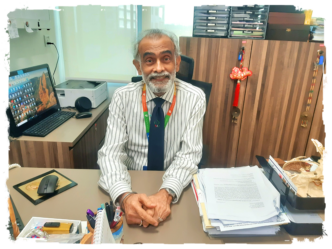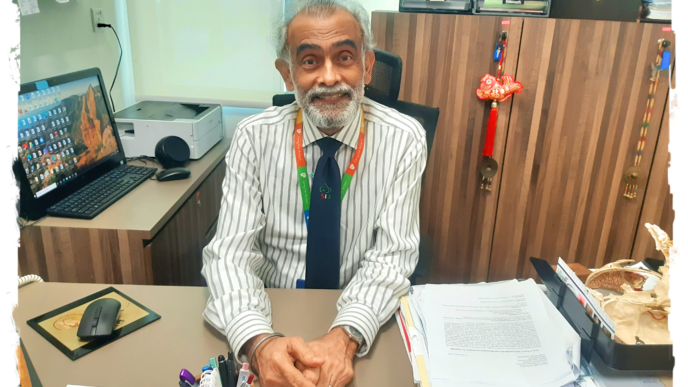WORDS LIM TECK CHOON
 FEATURED EXPERT FEATURED EXPERTDR CHOW SUET YIN Family Medicine Specialist IMU Healthcare |
Family medicine is often the backbone of healthcare, yet many people don’t fully understand its scope and importance.
To get a better understanding of this specialty, we had the privilege to talk to family medicine specialist Dr Chow Suet Yin about this specialty.
JUST WHAT IS FAMILY MEDICINE?
Dr Chow explains that family medicine takes a holistic approach, caring for individuals from birth to old age.
- It is a medical specialty that provides first-contact, continuous, and comprehensive healthcare for people of all ages, genders, and health conditions.
- It covers everything from acute illnesses and chronic disease management to preventive care and health education.
- “In short, family medicine covers patients from womb to tomb!” Dr Chow says.
THE CORE PRINCIPLES: 3Cs, 1P & 1H
“Family medicine stands apart from other specialties due to its unique focus on the following,” Dr Chow shares with us.
The Three Cs
- Comprehensive care. Family physicians treat patients of all ages and address a wide range of health concerns, including physical, mental, and developmental health.
- Continuity of care. Family physicians build long-term relationships with multiple generations of a family (grandparents, parents, children, and even grandchildren).
- Coordinated care. Family physicians collaborate with other medical specialists and healthcare teams to provide the best possible care for their patients.
The 1 P
- Preventive care. Family physicians emphasize on disease prevention, lifestyle changes, vaccinations, and routine screenings to help prevent or minimize the risk of health conditions as much as possible before they occur. After all, prevention is better than cure!
The 1 H
- Holistic approach. Family medicine considers physical health as well as emotional, psychological, and social factors that influence overall well-being.
HOW IS FAMILY MEDICINE DIFFERENT FROM GENERAL PRACTICE?
A common misconception is that family medicine and general practice are the same.
Both provide primary care for their patients—which is to say, people go to them first for medical attention when they have medical issues.
However, this is where the similarity ends.
Training
Family medicine specialists undergo 4 years of structured clinical training in various medical fields, including:
- Emergency medicine
- Paediatrics
- Internal medicine
- Obstetrics and gynaecology
- Psychiatry
- Dermatology
Their qualifications typically include a Master’s in Family Medicine (MMed Fam Med or DrFamMed) or Fellowship in Family Medicine (FRACGP, MRCGP, or MInTFM).
Such training includes rotations in hospital, health clinic and public health. “The training is thorough and extensive,” Dr Chow shares, “to equip the family medicine specialist to excel in preventive care and chronic disease management.”
On the other hand, general practitioners (GPs) may have diplomas in family medicine, but this does not equate to the extensive training of a family medicine specialist.
Expertise in Managing Certain Medical Conditions
While both GPs and family medicine specialists provide primary care, family medicine specialists have additional expertise in handling:
- Chronic diseases such as diabetes, hypertension, asthma, and heart disease. One tends to have more than one chronic diseases at the same time, so a family medicine specialist has to be adept in helping their patients managing multiple conditions simultaneously.
- Paediatric care from birth to adolescence, including vaccinations, developmental assessments, and childhood illnesses.
- Women’s health, including gynaecological exams, contraception, menopause management, and prenatal care.
- Geriatric care for age-related conditions like osteoporosis, dementia, and frailty.
- Preventive health and lifestyle counselling, including routine health screenings, vaccinations, diet advice, smoking cessation, and stress reduction.
- Mental health management, which covers depression, anxiety, and stress. Family medicine specialists can coordinate with psychologists and counsellors to co-manage one’s mental issue, for example by prescribing appropriate medications.
| Allied health officers such as psychologists and counsellors are not medical doctors. Therefore, they cannot prescribe medications. A family medicine specialist, however, is qualified to do so. Therefore, they can work closely with a psychologist or counsellor to help co-manage one’s mental condition. |
WHY FAMILY MEDICINE MATTERS MORE THAN EVER
Family physicians play a vital role in shaping public health.
Dr Chow explains: “A strong primary care system, led by family medicine specialists, can improve national health outcomes, reduce healthcare costs, and ensure better access to medical care for all.”
Such a care system is increasingly essential, as Malaysia faces an increasing burden of chronic diseases and an aging population.
“Expanding the presence of family medicine specialists in both public and private healthcare settings can lead to a healthier, more well-supported population,” Dr Chow says.
THE HUMAN SIDE OF FAMILY MEDICINE
Beyond the medical expertise, family medicine specialists develop deep, lasting relationships with their patients.
Many patients seek them out not just for medical care but for trust, familiarity, and continuity.
Dr Chow stresses that the building of trust between a family medicine specialist and the family is vital.
- “With trust, it would be easier for patient to disclose their health concerns, adhere to the treatment plans and medical advice and of course create better communication between the patient and the doctor,” she elaborates.
- “Thus, there will be better health outcomes in terms of the control of the medical condition, health behaviour changes and patients’ satisfaction,” she adds.
Whether it’s guiding a child’s development, managing a grandmother’s hypertension, or supporting mental health, family physicians impact lives in ways that extend far beyond the clinic walls.
So next time you visit your family doctor, remember—you’re not just seeing a physician. You’re consulting a healthcare partner who’s invested in your well-being as well as your family’s, for the long haul!
| This article is part of our series on the various facets of medical care. |














